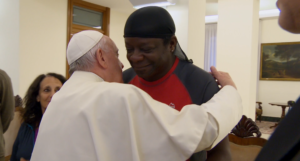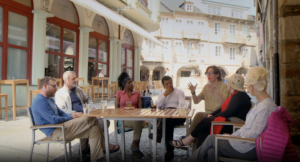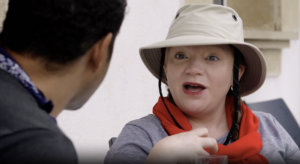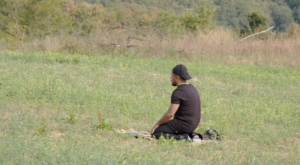This clip comes from the BBC series: Pilgrimage – The Road to Rome.
Over an evening meal, Stephen tells his fellow Pilgrims that – as a gay man – he doesn’t feel accepted by any religion. Dana talks about the problems that many Roman Catholics have, being caught between compassion for their gay friends, and the Church’s definition of marriage which is only between a man and woman. Mehreen talks about her belief that it is wrong to judge others, and Brendan stresses the importance of respect and discussion, and his belief that it isn’t the religions that cause problems, it’s the people within them!
Watch full episodes on BBC iPlayer.
Transcript
Pilgrimage Moments: Discussing Homosexuality and Acceptance
Narrator: At the end of a long day, and in keeping with good pilgrim tradition, it's time to break bread together.
Les: Should do the Italian way where we just chuck all the sauce into the pasta.
Lesley: Yes.
Stephen: Can I just ask a question, guys? Oh, guys, I thought this was a great opportunity tonight with such a diverse group to have a talk about religion. Great idea and I want to see if I can be enlightened.
Lesley: Wowser.
Lesley: Friends. My family.
Stephen: One of my main problems seems to be this word intolerance. I don't think for me there is any organized religion or faith that embraces me.
Katy: Do you mean as a gay man?
Stephen: Absolutely.
Brendan: If I'm gay in the churches sense Catholic church, that is fundamentally wrong. Now, I know so many gay people. My brother is gay. If that is the case, if that is the Catholic Church belief, then surely my brother is screwed. Stephen is screwed because of one belief of of of the faith. How do you feel about that?
Dana: I, I also have many friends who are gay that I love very much. Compassionate because I think the gay community suffered greatly. Even among the gay community, there are different ideas, there are different thoughts. I have friends who are gay, who are married because they want to be married. I have friends who are gay who feel that the term marriage or the sacrament of marriage shouldn't be shifted from where it has been between a man and a woman. It's also very difficult if, say, a Catholic, if you believe that a gay person should be given every respect and every protection under the law, but that marriage should be as it has always been, between a man and a woman. And yet, if you say that you're suddenly identified as being homophobic, which is not right either, and even within our church, it's a very contentious issue at this time.
Stephen: The way you said that so eloquently, if that was the message given out by the church, then people would understand. But if people's kneejerk responses, a marriage between a man and a woman end of, then you're going to upset a lot of people.
Dana: Yeah. And that's why it's so hard for me to speak on behalf of a church which is already in tumult, you know, trying to sort this question out.
Mehreen: You've been talking about homosexuality, and I don't have enough of an in-depth knowledge about it to make any certain statements. I can't say all Muslims are going to say, yeah, it's cool to be gay at all. I know that I've got friends who are Muslim and gay, and I know that they will probably explain a lot better than me of the reasons why they don't think the two are mutually exclusive. What I can say is that for someone to tell you, you're going to hell. That is a bigger sin than homosexuality. That is the biggest sin. Right.
Stephen: And that is why this has been a wonderful experience thus far. Because whatever faith or religion you have or you practice, if you don't allow me to ask questions. Yes. And be inquisitive about it. Yeah. And then you reasonably respond to me with something as opposed to rejecting me. We ain't going to get on. Yeah.
Brendan: Uh, I hate to get all lovey dovey and everything, but we're a group of really different faiths and backgrounds. Yet we've all been able to to spend a week in each other's company and have incredible conversations, complete respect for the most part of our different faiths and things. And if you said to me at the start of this week, uh, there's going to be I feel like there's a joke, a muslim, a Jew and a and I've actually learned a lot. And what I've recognized is that it's not the religion that's that's the problem. It's the people within it that create the problems. Because actually the whole party, how can we all get on so, so well with our different backgrounds? Because we're hopefully, for the most part, really genuinely decent people. It's not the religions that define us, it's the people within the religions that create the problems.








